Process your Fear: Choosing the Right Processor
Layers of Fear is a popular game available on both Windows and macOS. If you're looking to buy a laptop to play it on, the first thing to consider is the processor. Since the game is single-threaded, we can narrow our search down to a few CPU series – Ryzen, Core i5/i7, and Intel's high-end U-series chips.
When it comes to gaming laptop processors, the latest market trends show that Apple has released MacBooks with ARM-based M1, M2, M2 Pro, and M2 Max system-on-chip modules; they offer exceptional single-core performance and battery life. Meanwhile, AMD has captured 20% of the laptop CPU market. There are plenty of notebooks with 6th-generation Ryzen CPUs. Just recently, AMD has begun shipping the first batches of laptops equipped with its latest 7th-generation Ryzen processors. On the other hand, Intel's 13th-generation Core processors have already been released, but 12th-generation Core CPUs can still provide a lot of value, especially if you don't need cutting-edge performance.
If you're looking for a high-end gaming laptop, look for an H-series processor from either AMD or Intel. If you're looking for a more affordable option, an U-series chip will do just fine. If you want a long battery life, get a gaming notebook with an Nvidia graphics card since these have better power management than AMD (though AMD is catching up).
To rank processors by performance in games, I use Cinebench R20 benchmarks because it's a popular test that measures single-core performance. Alternatively, you could use PassMark if you want a more complete picture of your laptop's performance.
Here are our recommendations for laptop processors based on price range:
| Processor | Price Range | Description |
|---|---|---|
| i3-1115G4 | Below $600 | A budget-friendly option that can run Layers of Fear without issue. |
| i5-1135G7 | $600-$1000 | A more powerful option that can handle other tasks as well as gaming. |
| i7-11370H | Above $1000 | A high-end processor that can run the game at the highest settings and handle other demanding tasks. |
In summary, if you're looking for a laptop to play Layers of Fear, consider the processor carefully and choose one that suits your needs and budget.
Unleash Your Inner Artist with These Graphics Cards
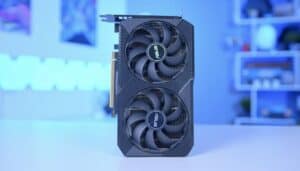
If you're planning to play Layers of Fear on a laptop, then you'll need a dedicated GPU. Nvidia's graphics cards currently dominate the laptop market, and their RTX series cards are your best bet for gaming laptops.
It's important to note that Layers of Fear is a demanding game, particularly if you want to play it at high framerates. So, if you can afford it, I recommend going for a higher-end model with a top-of-the-line GPU from Nvidia's latest generation (RTX 20 or above).
When it comes to comparing GPUs, I like to use 3DMark since it's an industry-standard benchmark. However, keep in mind that these scores aren't indicative of real-world performance since laptops often throttle their GPUs to conserve battery life and manage heat.
Here are my recommendations for laptop GPUs based on price range:
- Minimum: GeForce GTX 1650
- Recommended: GeForce RTX 3050
- High-end: GeForce RTX 2060
In summary, if you want to play Layers of Fear on a laptop, then make sure you get a dedicated GPU. Aim for a higher-end model if you can afford it, and look for Nvidia's latest RTX series cards for the best performance.
Unlock the Doors of Fear with Ample RAM
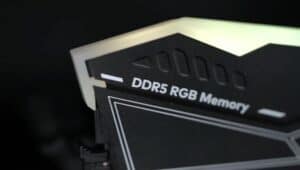
Layers of Fear is a visually stunning game with demanding hardware requirements. If you're planning to play it on a laptop, you need to ensure that your device has enough memory to run it smoothly.
How much memory is needed for gaming?
The minimum RAM requirement for gaming is 8 GB, but this is not enough for modern games like Layers of Fear. We recommend a minimum of 16 GB to ensure smooth gameplay. However, if you want to run other applications while gaming or plan to play more demanding games, you might want to consider 32 GB or more.
Why DDR4 is still a relevant upgrade option
While the latest CPUs support DDR5, it is still expensive and not yet widely available. DDR4 is still the most common memory technology and is sufficient for most gaming laptops. Moreover, DDR4 is still getting faster with new generations and can offer good performance upgrades.
What to look for when buying RAM
When buying RAM for your laptop, consider its latency, frequency, and error-correcting code (ECC). Lower latency is better, and a higher frequency can offer better performance. ECC can detect and correct errors in memory, ensuring that your device is running smoothly and stable.
Table of recommended RAM configurations at various price points
| Price range | RAM configuration |
|---|---|
| Budget | 16 GB DDR4 with 2666 MHz frequency |
| Mid-range | 16 GB DDR4 with 3200 MHz frequency |
| High-end | 32 GB DDR4 with 3200 MHz frequency and ECC |
In conclusion, Layers of Fear requires a decent amount of memory to run smoothly on a laptop. For optimal performance, we recommend a minimum of 16 GB of RAM with DDR4 technology. For high-end gaming, consider getting 32 GB of RAM with a higher frequency and ECC support. Remember to check the latency and frequency when buying RAM to ensure that you're getting the best possible performance within your budget.
Fear not, here are the answers.
Q: Can a laptop run Layers of Fear Remake?
Yes, a laptop can run Layers of Fear Remake. However, the performance and experience may vary depending on the laptop's specifications.
What are the recommended laptop specs for Layers of Fear Remake?
The recommended laptop specs for Layers of Fear Remake are 16 GB of memory, a GeForce RTX 3050 graphics card, and an i5-1135G7 processor. These specs will ensure smooth gameplay and optimal visual quality.
What is the best laptop for playing Layers of Fear Remake?
The best laptop for playing Layers of Fear Remake depends on your budget and requirements. In the medium price range, we recommend the HP Victus, ASUS TUF F15 FX507ZM-ES74, and Lenovo Legion 5 Pro. For maximum performance, consider the ASUS ROG Strix Scar, Lenovo Legion Pro 7i 16, or Dell XPS 17 9720.
Does Layers of Fear Remake require a powerful laptop?
Layers of Fear Remake can be played on a range of laptops, from budget to high-end. While it does benefit from more powerful hardware, it is not overly demanding, so a mid-range laptop should be able to provide a smooth gaming experience.
Can I play Layers of Fear Remake on a budget laptop?
Yes, you can play Layers of Fear Remake on a budget laptop. The minimum requirements include 8 GB of memory, a GeForce GTX 1650 graphics card, and an i3-1115G4 processor. While you may need to lower some graphical settings, it should still be playable.
What are the minimum laptop requirements for Layers of Fear Remake?
The minimum laptop requirements for Layers of Fear Remake are 8 GB of memory, a GeForce GTX 1650 graphics card, and an i3-1115G4 processor. These specs should allow you to run the game, although some graphical settings may need to be adjusted for optimal performance.
Is a dedicated graphics card necessary for playing Layers of Fear Remake on a laptop?
While a dedicated graphics card is not strictly necessary, it is highly recommended for playing Layers of Fear Remake on a laptop. Integrated graphics may struggle to provide a smooth gameplay experience, especially when it comes to rendering complex visuals and effects.
Can I run Layers of Fear Remake on an integrated graphics laptop?
It is possible to run Layers of Fear Remake on an integrated graphics laptop, but the performance may be limited. You may need to lower the graphical settings and expect lower frame rates. For a better experience, a laptop with a dedicated graphics card is recommended.
How to choose a laptop for Layers of Fear Remake?
When choosing a laptop for Layers of Fear Remake, consider the game's recommended specs as a starting point. Look for laptops with at least 16 GB of memory, a GeForce RTX 3050 or better graphics card, and an i5-1135G7 or higher processor. Additionally, prioritize laptops with good cooling systems and displays capable of reproducing deep blacks and vibrant colors.
Can I play Layers of Fear Remake smoothly on a mid-range laptop?
Yes, you can play Layers of Fear Remake smoothly on a mid-range laptop. Laptops with specifications like 16 GB of memory, a GeForce RTX 3050 graphics card, and an i5-1135G7 processor should be able to handle the game well, delivering an enjoyable gaming experience without breaking the bank.
As an avid gamer and laptop enthusiast, I understand that finding the best laptop for Layers of Fear Remake requires careful consideration. Layers of Fear, the psychological horror game developed by Bloober Team, is set to receive a remake, and you'll want to ensure your laptop can handle the updated visuals and immersive gameplay. The ideal laptop for this game should balance performance, display quality, and portability to provide the most enjoyable gaming experience.
When reviewing an extensive laptop spreadsheet of recent releases, I compared specs and reviews (both professional and user-generated) and narrowed down the top laptops based on the requirements of the Layers of Fear Remake and price ranges. This process involved paying close attention to the game's recommended system requirements and factoring in elements such as graphics capabilities, processing power, and display features like refresh rate and resolution. Since the game's atmosphere and storytelling are crucial to the experience, having a high-quality display and audio setup is essential for full immersion.
As a member of the Layers of Fear community, I understand the significance of discussing the game with fellow fans on forums and subreddits, as well as following the latest news from Bloober Team. This helps me stay up-to-date on game updates and laptop recommendations from other players. By considering these factors, I've compiled a list of the best laptops for Layers of Fear Remake that cater to various budgets and preferences, ensuring that you can dive into the eerie world of the game with the perfect machine by your side.
6 Best Laptops for Layers of Fear Remake
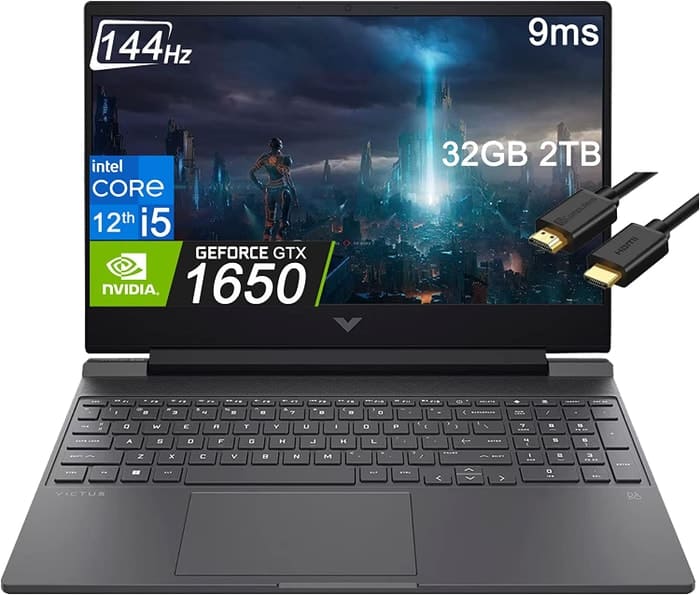
1.HP Victus 15
HP Victus 15: A Budget Gaming Laptop with Impressive Performance, but Limited Battery Life and Plain Design.- Excellent price
- Good gaming performance
- Can double as a work laptop
- Solid array of ports
- Bad battery life
- Rather plain design
- Weak GPU yields unsatisfactory frame rates
- Screen only so-so despite 144Hz refresh rate
Summary
The HP Victus 15 offers excellent gaming performance at an affordable price, making it a great option for budget-conscious gamers. It features a solid array of ports, a 144Hz refresh rate display, and the ability to double as a work laptop. However, it falls short in terms of battery life and has a rather plain design.
Alternatives
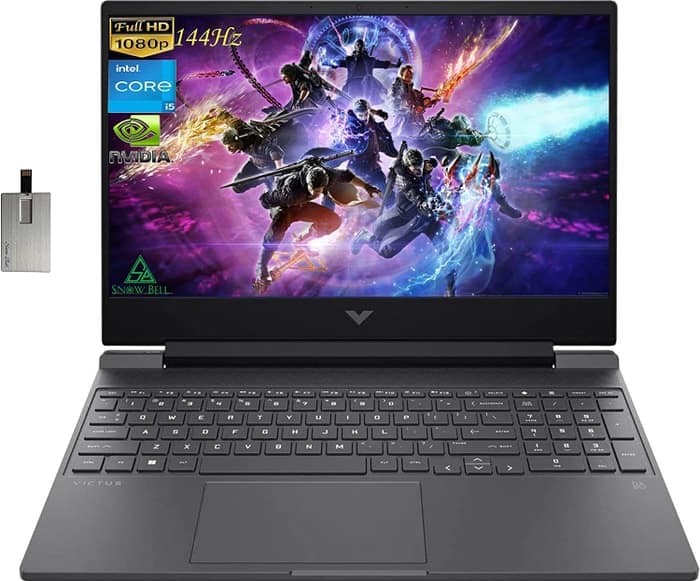
HP Victus
- Delivers smooth gameplay at 1080p.
- Fast SSD.
- No variable refresh rate (VRR) to reduce screen tearing.
- Some performance loss on CPU under load.

2.ASUS TUF Dash F15
ASUS TUF Dash F15: A budget-friendly and powerful laptop for all-purpose and gaming needs.- Lightweight and well-built
- Good inputs and IO
- Multiple screen options (FHD 300Hz and QHD)
- Significantly more powerful than the previous generation
- Some quirks affecting everyday ergonomics
- Ports squeezed together on the left edge
- Be cautious of the FHD 144Hz panel option
Summary
The ASUS TUF Dash F15 is a competitively priced and well-built laptop that offers a significant upgrade in performance compared to its previous generation. With its lightweight design, good inputs, and multiple screen options, it is a great option for those on a lower budget. However, be cautious of the FHD 144Hz screen option.
Reviews
Alternatives

Lenovo Legion 5i Pro 16
- Stylish, sleek form factor
- Gorgeous display
- Webcam quality is poor
- Lacks biometric features
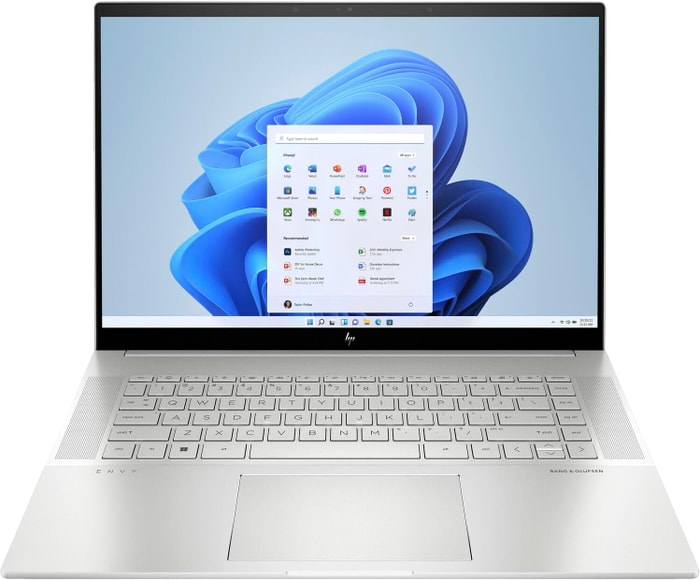 $1,800
$1,8003.HP Envy 16
HP Envy 16: A powerful laptop for creative apps and light gaming, but with some trade-offs.- Plenty of CPU and GPU power
- New 120Hz screen refresh rate
- High-res webcam
- Sleek design
- Merely adequate base screen
- Optional OLED has fewer pixels than before
- Bulky and heavy
Summary
With its powerful CPU and GPU, the HP Envy 16 is a great choice for creative apps and light gaming. It also offers a high-refresh rate display and a high-resolution webcam. However, the laptop is let down by its bulky and heavy design, as well as a base screen that is only adequate.
Reviews
Alternatives

ASUS ROG Strix G15
- High-performance CPU and GPU
- Good workmanship and design
- Skimpy connectivity
- Coil whine in certain situations
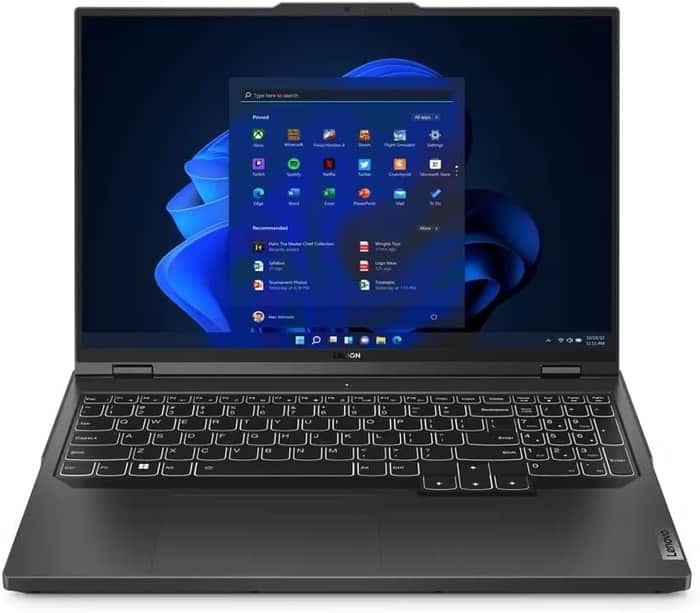
4.Lenovo Legion Pro 5
Lenovo Legion Pro 5: A solid mid-tier laptop with good performance and build quality, but lacks in battery life and speaker quality.- Good build quality and design
- Good screen and IO
- Competent CPU with multiple GPU options
- Competitively priced
- No Thunderbolt or biometrics
- Hotspots during gaming
- Poor speakers
- So-so battery life
Summary
The Lenovo Legion Pro 5 is a well-built and competitively priced mid-tier laptop with a good screen and inputs. It offers plenty of performance, but potential buyers should be aware of its hotspots in sustained loads, limited battery life, and lacking speakers.
Reviews
Alternatives
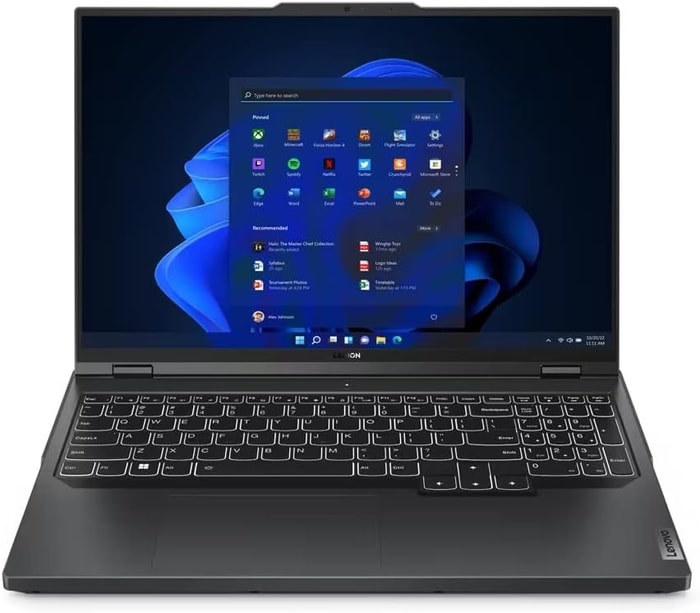 $2,840
$2,840Lenovo Legion Pro 5
- Strong performance for the price
- Quality build and port selection
- Display quality and battery life are just decent
- Bulky and heavy

5.Lenovo Legion Pro 7i 16
Lenovo Legion Pro 7i 16: A sleek and powerful gaming laptop that offers impressive performance at a fair price.- Strong overall performance
- Big, bright, and fast display
- Per-key RGB lighting
- Some flex to keyboard deck
- Poor battery life
Summary
The Lenovo Legion Pro 7i 16 is a sleek and unassuming gaming laptop that packs a punch with its i9-13900HX processor and RTX 4090 graphics card. While it may have some limitations in terms of GPU performance, it offers strong overall performance, a big and fast display, and per-key RGB lighting, making it a great option for gamers on a budget.
Alternatives

HP Omen 17
- QHD display with 165 Hz
- Expandable working memory
- Slightly below-average performance for a RTX 4080
- High noise level
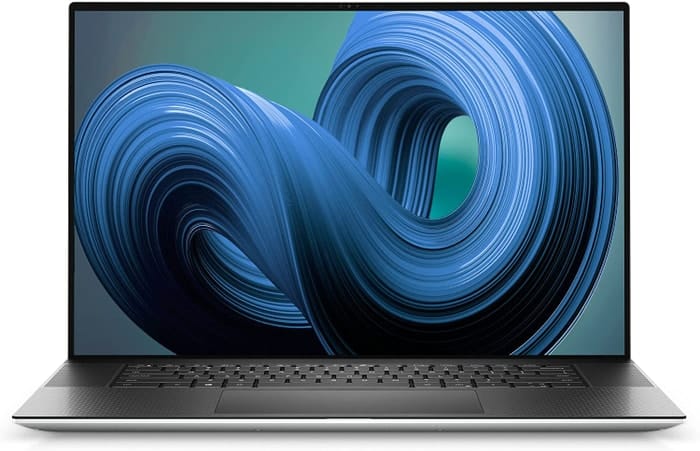
6.Dell XPS 17 9720
Dell XPS 17 9720: A powerful laptop with a stunning 4K display, but with some graphics and cooling limitations.- Excellent 4K display with AdobeRGB
- High-quality case
- Thunderbolt 4 PCIe 4.0
- Very high system performance
- Lower graphics performance than the predecessor
- Performance not completely stable under combined load
- Not Wi-Fi 6E compatible
- 720p webcam
Summary
The Dell XPS 17 9720 is equipped with an excellent 4K display with AdobeRGB, a high-quality case, and powerful components for high system performance. However, it falls short in terms of graphics performance compared to its predecessor and the cooling system could be improved.
Reviews
Alternatives
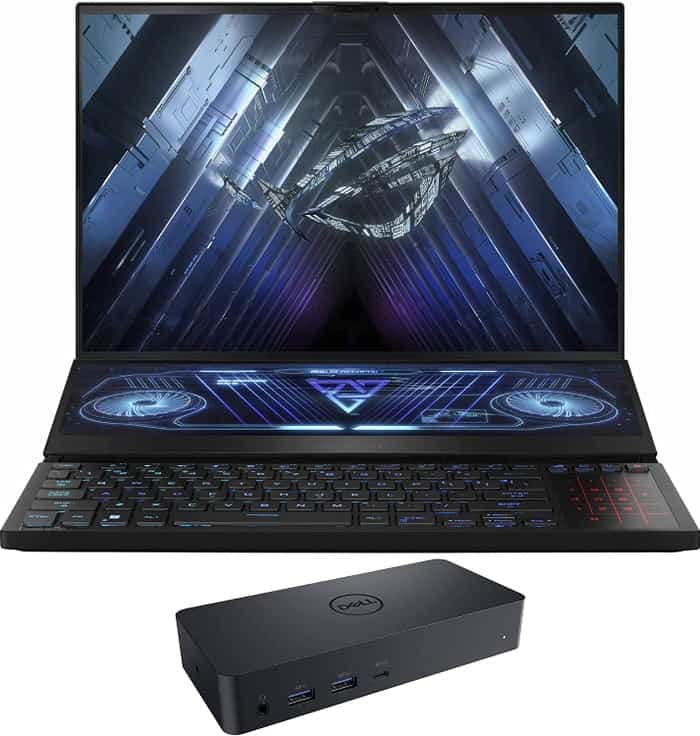
ASUS ROG Zephyrus Duo
- Impressively thin and elegant design with dual displays
- Refined two-screen layout
- Eye-watering cost, especially as configured
- Awkward keyboard and touchpad layout
Table of the Best Laptops for Layers of Fear Remake
| Laptop | Price (approx) |
| HP Victus 15 | $880 |
| ASUS TUF Dash F15 | $1,160 |
| HP Envy 16 | $1,800 |
| Lenovo Legion Pro 5 | $2,630 |
| Lenovo Legion Pro 7i 16 | $3,390 |
| Dell XPS 17 9720 | $5,600 |





